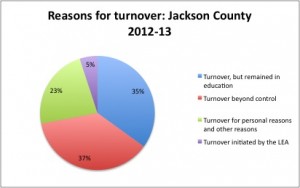In June 2013, North Carolina Governor Pat McCrory shifted his attention to the state’s education system, hoping to create a new, refreshing method of increasing teacher pay while catering those who perform at a high level.
Thus far, it has not gone as planned. Less a year later, North Carolina remains 46th in the United States in teacher pay, and legislature is still in the process of trying to implement the comprehensive education reform.
Numerous teachers in the Jackson County area have given their insight and perspective on the changes and Buncombe County’s Board of Education passed a resolution against a major component of the reform this past March.
No more tenure
The most controversial aspect of the law addresses a pay-for-performance approach and plans to gradually phase out teacher tenure, also known as “career status,” by 2018. The idea is to identify the top 25 percent of teachers and offer them a $500 raise per year for the duration of four years.
The catch is that in order to accept the raise, teachers must first give up their career status, which is designed to reward teachers for their experience by giving them a right to due process after their fourth year of teaching. For an administration to get rid of a teacher with career status, it must first go through a hearing process to justify the firing.
That being said, according to veteran teacher at Cullowhee Valley School Lora Cox, this doesn’t always mean protection for NC teachers.
“There is a big misconception that having tenure means having ‘job security.’ My position as a tenured teacher is no more secure than any other,” said Cox in an email message. “All tenure indicates is that I have the right to a hearing if I were to be dismissed. I have a right to know what I am being dismissed for. North Carolina is a ‘right to work’ state, meaning that anyone at any time can be dismissed for any reason, without due process.”
Dr. Kelly Tracy, an assistant professor in the College of Education and Allied Professions at WCU, said that the lack of legitimate job security can hurt the teachers because sometimes they must go against the opinion of an administrator or parent to do their jobs effectively. When teachers are given a sense that at any moment they could lose their jobs, “they can become compliant,” said Tracy.
Still, even though tenure doesn’t provide as much protection as it would in some other states, forcing teachers out of the career status has been met with a lot of opposition throughout NC.
During the Buncombe County Schools BOE meeting on March 6, Chairman Bob Rhinehart read through the board’s resolution against the tenure law:
“Whereas the 25 percent mandate fails as a merit-based pay initiative that teachers had no prior notice of the criteria necessary to earn additional compensation; and whereas this school system has far more than 25 percent of its teachers that deserve a merit-based pay raise, given the excellent service they provide to our students, and therefore, the 25 percent mandate is divisive, inequitable and demeaning to our teachers.”
Rhinehart then cited a recent survey conducted by Buncombe County Schools in which 82 percent of teachers said they would decline the contract in exchange for keeping their career status. Other board members advised teachers to join the 82 percent as a way of sending a message to NC legislature and making their voices heard.
Dr. Holly Henderson Pinter, also an assistant professor in the College of Education and Allied Professions at Western, echoed the board’s point about divisiveness by mentioning that teachers rely on each other for lesson plans and advice on how to perfect their craft.
“Teaching is a unique profession in the way of collaboration,” said Pinter. “You depend on your colleagues to help you be successful. The tenure raise is pitting teachers against each other.”
To conclude their meeting on March 6, the Buncombe County BOE unanimously passed their resolution for the reasons stated above, and questioned the constitutionality of taking away the right of tenure for teachers that have already met the standards necessary to acquire it.
Raising the base pay
Another dissonant section of the law is an increase in salary for teachers with less than 10 years of experience up to the national yearly average of $35,000. The teachers that fall in line with this increase will see their raise in salary over the course of the next two years.
McCrory’s education advisor, Eric Guckian, appeared on Raleigh’s WRAL “On the Record” segment back in January 2014. He spoke about the current reform being part of a larger long-term solution and said, “We want to raise the floor and then we’ll raise the ceiling” in reference to the teachers with more than 10 years of experience not receiving a raise in the immediate future.
The focus on increasing the base salaries comes on the heels of the state’s Annual Report on Teachers Leaving the Profession from 2012-13, which shows a teacher turnover rate of 14.33 percent – the highest that number has been in the past five years. In comparison to the average, Jackson County had a turnover rate of 17.34 percent, with 43 of its 248 teachers leaving.
“I understand the logic behind wanting to increase beginning teacher salary. North Carolina is in clear competition with other states to keep young, energetic, tech-savvy teachers in its classrooms,” said Cox. “With that said, I also believe that it is important not to alienate the veteran teachers. Those of us with more than ten years of experience have been through many changes in public education. We have embraced those changes and run with them. We were there as the ABCs were implemented, as No Child Left Behind was implemented and as the Common Core/Essential Standards were implemented. We are dedicated to the children in our care and to our profession,” she continued.
Tracy, using similar language as Pinter and Cox, said the increase in salary “is certainly deserved by all teachers, but focusing only on beginning teachers further discourages veteran teachers who have valuable knowledge and experience from staying in the field.”
This potential rift is dangerous when considering the difficulty of the profession, especially for new teachers entering the field. “In my experience, teaching is much harder than people expect it to be, and it’s easy to feel isolated in your first years if there is not enough district infrastructure to support you,” said Amanda Clapp, another teacher at Cullowhee Valley, via email. “Raising the salary is a first step, but the state needs to modify the evaluation structure so that new teachers have a chance to improve; they are often evaluated poorly, but not given the help they need to improve.”
Cox made a comparable point regarding the stresses of the job. “Increasing the starting salary is not a remedy in itself. It helps, but is not a cure-all,” said Cox. “I have hosted interns, block placement students and observers for many years. What I hear from them is that they become overwhelmed with paperwork, working with parents and extended families and the lack of available resources.
“Classrooms are becoming more and more diverse, and families are facing more and more challenges. The overwhelming pressures of meeting the needs of the individual child, working in an assessment-driven environment, dealing with the lack of available resources and the amount of work that has to be done outside of the regular school day is incredibly stressful.”
An unclear future
The education system in NC is noticeably unstable. Teachers throughout the region and at different levels of the profession have expressed their concerns about the reform. In other parts of the state, the Guilford and Durham County school boards have both filed suits opposing the tenure law, and many others, including Jackson and Haywood County, have passed resolutions against it.
Previously, McCrory had to make an adjustment that would have made the completion of a master’s degree financially irrelevant. As it stands now, teachers with a master’s degree and those in pursuit of one prior to 2013 will see the financial benefits, but future educators will have no financial incentive to further their own education.
McCrory also announced that he and his staff will consider making changes to the tenure law and will come to a decision by May – a result of the recent backlash against the provision. In the meantime, if the plan is still to raise the floor before acknowledging the ceiling, they better hope it doesn’t come crashing down on them before they figure it out.
“In order to keep people from leaving the profession, we need to start treating it like a profession,” said Pinter. “There needs to be a culture shift to appreciate teachers for what they do.”
“Long term, teachers need to be paid enough [so] that pay is not an issue; then, they need to be supported by administration and parents,” said Clapp. “It’s through a strong community that teachers can be retained and feel connected in their jobs.”




